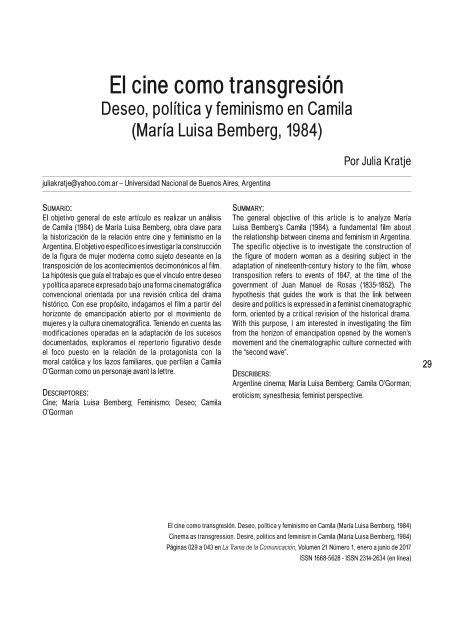Artículo
El objetivo general de este artículo es realizar un análisis de Camila (1984) de María Luisa Bemberg, obra clave para la historización de la relación entre cine y feminismo en la Argentina. El objetivo específico es investigar la construcción de la figura de mujer moderna como sujeto deseante en la transposición de los acontecimientos decimonónicos al film. La hipótesis que guía el trabajo es que el vínculo entre deseo y política aparece expresado bajo una forma cinematográfica convencional orientada por una revisión crítica del drama histórico. Con ese propósito, indagamos el film a partir del horizonte de emancipación abierto por el movimiento de mujeres y la cultura cinematográfica. Teniendo en cuenta las modificaciones operadas en la adaptación de los sucesos documentados, exploramos el repertorio figurativo desde el foco puesto en la relación de la protagonista con la moral católica y los lazos familiares, que perfilan a Camila O’Gorman como un personaje avant la lettre. The general objective of this article is to analyze María Luisa Bemberg’s Camila (1984), a fundamental film about the relationship between cinema and feminism in Argentina. The specific objective is to investigate the construction of the figure of modern woman as a desiring subject in the adaptation of nineteenth-century history to the film, whose transposition refers to events of 1847, at the time of the government of Juan Manuel de Rosas (1835-1852). The hypothesis that guides the work is that the link between desire and politics is expressed in a feminist cinematographic form, oriented by a critical revision of the historical drama. With this purpose, I am interested in investigating the film from the horizon of emancipation opened by the women’s movement and the cinematographic culture connected with the “second wave”.
El cine como transgresión. Deseo, política y feminismo en Camila (María Luisa Bemberg, 1984)
Fecha de publicación:
01/2017
Editorial:
Universidad Nacional de Rosario. Facultad de Ciencia Política y Relaciones Internacionales
Revista:
La Trama de la Comunicación
ISSN:
1668-5628
Idioma:
Español
Tipo de recurso:
Artículo publicado
Clasificación temática:
Resumen
Palabras clave:
María Luisa Bemberg
,
Camila (1984)
,
Mujer Deseante
Archivos asociados
Licencia
Identificadores
Colecciones
Articulos(SEDE CENTRAL)
Articulos de SEDE CENTRAL
Articulos de SEDE CENTRAL
Citación
Kratje, Julia; El cine como transgresión. Deseo, política y feminismo en Camila (María Luisa Bemberg, 1984); Universidad Nacional de Rosario. Facultad de Ciencia Política y Relaciones Internacionales; La Trama de la Comunicación; 21; 1; 1-2017; 29-43
Compartir




